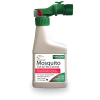Consider growing these plants in your garden.
Warmer weather means we can take advantage of outdoor activities like backyard BBQ’s, swimming, and gardening. It also means that it’s time to get out the mosquito repellent. You shouldn’t have to worry about pesky mosquitoes putting a damper on your outdoor enjoyment—instead, consider growing these plants and flowers in your garden to keep mosquitoes away naturally. By using plants and flowers to repel mosquitos, you can skip the DEET and other harsh chemicals this summer. Here are some mosquito repelling plans that you may want to consider for your garden.
Basil
Basil is a great addition to any garden, not only for cooking, but also because it is a natural mosquito repellent. Certain varieties such as lemon or cinnamon have a more potent smell, increasing the results.
Catnip
While some see catnip as a way to stimulate our feline friends, it is actually 10 times more effective than DEET at repelling mosquitoes. The active ingredient is Nepetalactone, which mosquitoes hate.
Citronella Grass
Citronella is the go-to option when it comes to natural mosquito repellent, as its oil is used to make many name-brand insect repellents. Plant citronella grass around outdoor living areas to keep mosquitoes away naturally.
Lavender
Gardeners love lavender because it has an amazing smell and attracts favorable insects and birds, which dine on mosquitoes. The lavender essential oil also wards off mosquitoes. If that wasn’t reason enough, lavender also has anti-bacterial and stress-relieving benefits when brewed in tea. Plant lavender near windows and doors to keep mosquito populations at bay.
Lemon Balm
Also known as horse-mint, this hardy plant requires very little care. Not only does lemon balm repel mosquitoes, it can also help to soothe cold sores and acne, and relieve stress and pain.
Lemon-Scented Eucalyptus
This Australian native is the only natural mosquito repellent on this list with a blessing from the CDC. Its mosquito-repelling qualities come from the strong lemon scent that it emits. The only issue is it doesn’t do well in the cold, so be careful in the winter.
Lemon Thyme
This repellent requires you to rub the leaves onto your skin. Lemon thyme also produces an amazing aroma, and can be used in dishes calling for lemon or thyme.
Marigolds
Marigolds are a common flower, easy to care for and look great. The flowers contain pyrethrum, an active ingredient that’s used in some insect repellents. Marigolds repel many insects, and according to our Facebook community, can repel rabbits as well!
Neem
Tests have shown neem to be 10 times more effective at repelling mosquitoes than DEET. To grow neem in the US, ensure the tree is never colder than 30° F or below.
Peppermint
This plant can spread quickly across your garden, and is easy to maintain. In addition to repelling mosquitoes, peppermint helps with digestive issues, concentration and flavoring teas or cooking dishes.
Rosemary
This herb is commonly planted for its aroma, taste, and health benefits, but it is also one of the most popular mosquito-repelling plants. Boil it in water to use it as a spray repellent and let this hardy herb keep unwanted mosquitoes away from your garden.
By planting mosquito-repellent plants and flowers in your garden, you can enjoy warm summer days without worrying about mosquito bites or having to use harsh chemicals. Give these mosquito-repelling plants a try this season! Want more ideas for mosquito repellent? View our mosquito-repelling container garden.
We hope this guide helps you repel mosquitoes in your outdoor space. Remember, when dealing with new and unfamiliar plants, it is always a good idea to do your own research and be careful. Natural does not always mean safe. For the latest seasonal tips and DIY know-how, sign up for our e-newsletter, The Monthly Dirt, follow our social channels or give us a call.




